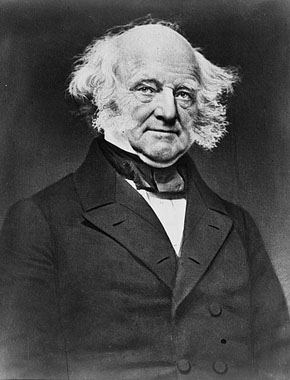Search This Blog
Thursday, January 5, 2012
Martin Van Buren
Served as president from 1837-1841
Era: The Jacksonian Era
American Identity and Culture
During Martin van Buren’s presidency, the country went through an economic crisis. Americans experienced great misfortune and hunger. Unemployment rates increased and people began protesting. Van Buren’s four years in the White House was marked with bank failures, bankruptcies and massive unemployment. This misfortune gave the Whigs an opportunity to step up and take control of the government. (The Whig Party was established during Jackson’s presidency). Because of this tumultuous period that occurred during his presidency, van Buren was given the nickname “Martin van Ruin.”
Economic Transformations and Globalization
The Panic of 1837 was an economic depression that partially resulted from the decisions made during Jackson’s presidency. Jackson’s opposition to the Bank of the United States and his decision to veto its recharter doubled the total number of banks, which in turn, made bank note values triple. In May 1837, prices tumbled and banks suspended specie payments (converting paper money into gold and silver). In response to this crisis, President Van Buren established an independent treasury. This system kept government funds separate from the system of the national bank.
Environment
In 1838, Martin van Buren finally went through with his predecessor’s plans to resettle the Native Americans west of the Mississippi. 15,000 Cherokees were forced to leave Georgia by the U.S. Army. This resulted in the deaths of 4,000 Cherokees due to the hardships they endured. Though they were promised supplies, the government never followed through and the lack of it along with harsh weather and conditions caused many to perish on the way. Their infamous trek towards the west was called the “Trail of Tears” because the people endured challenges like disease, exhaustion, and hunger during the forced march.
Politics and Citizenship
The Whigs were placed in an ideal environment to bring down Van Buren and the Jacksonian Democrats during the election of 1840. This was due to the fact that voters were dissatisfied with the economy and the bad shape that it was in. The Whigs’ presidential candidate was William Henry “Tippecanoe” Harrison. In order to emphasize his modest origins, they used symbols like hard cider and log cabins; hence the “Log Cabin and Hard Cider” campaign which occurred in 1840. They also used name calling as a form of propaganda, which was where the nickname “Martin van Ruin” originated from. The Whigs also portrayed Van Buren as an aristocrat with a taste for foreign wines.
Slavery and its legacies in North America
Once Texas gained independence from Mexico, it applied for statehood. However, Van Buren (just like Jackson) refused to annex the territory. One of his reasons for this was because he opposed slavery, and annexing Texas would only add to the slave states. Also during this time period, freedmen (free African Americans; non-slaves) in the North had little to no rights and almost none could vote. Meanwhile, in the South, slavery remained and slaves were only protected by “Slave Codes” that prevented inhumane treatment. Slavery became more important as cotton plantations became the foundation of the southern economy.
War and Diplomacy
One issue that Martin van Buren faced when he became president was a potential conflict with Great Britain. At this time, Canada was fighting for its independence and some American citizens were helping the Canadians with the cause by selling guns and supplies to them. The rebels took refuge on an island which divided Canada and the U.S. (specifically New York). After the British ordered Canadian loyalists to destroy a supply ship that killed one American, people wanted to declare war against Britain. Van Buren declared U.S. neutrality on the issue of Canadian independence in January 1838 and Congress enforced it by passing a neutrality law discouraging Americans from participating in foreign conflicts.
Subscribe to:
Post Comments (Atom)

No comments:
Post a Comment